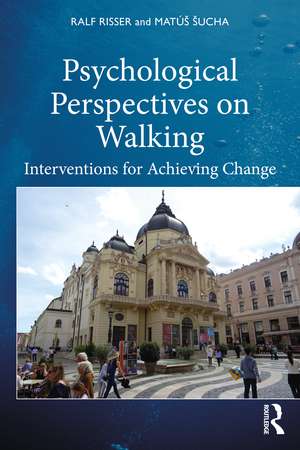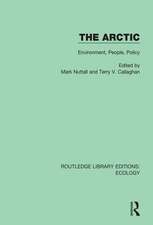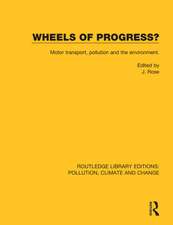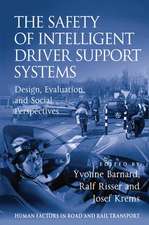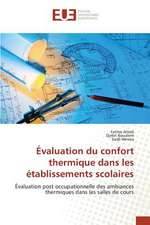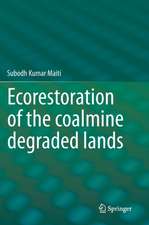Psychological Perspectives on Walking: Interventions for Achieving Change
Autor Ralf Risser, Matúš Šuchaen Limba Engleză Paperback – 13 iul 2020
The book investigates the motivations that can lead to increased walking, advises on how to build walking-conducive habits, and recommends strategies for decision makers for promoting changes that will allow walking to thrive more easily. The authors include success stories and lessons learned from what have become known as 'walkable' cities to show how interventions and initiatives can succeed on a practical basis.
This accessible, practical book is essential for urban planners; health specialists; policy makers; traffic experts; psychology, civil engineering, and social sciences students; and experts in the field of sustainable mobility. Psychological Perspectives on Walking will appeal to anyone in the general population in favour of a sustainable and healthy lifestyle.
| Toate formatele și edițiile | Preț | Express |
|---|---|---|
| Paperback (1) | 316.53 lei 6-8 săpt. | |
| Taylor & Francis – 13 iul 2020 | 316.53 lei 6-8 săpt. | |
| Hardback (1) | 894.53 lei 6-8 săpt. | |
| Taylor & Francis – 13 iul 2020 | 894.53 lei 6-8 săpt. |
Preț: 316.53 lei
Nou
Puncte Express: 475
Preț estimativ în valută:
60.57€ • 65.78$ • 50.88£
60.57€ • 65.78$ • 50.88£
Carte tipărită la comandă
Livrare economică 22 aprilie-06 mai
Preluare comenzi: 021 569.72.76
Specificații
ISBN-13: 9780367322588
ISBN-10: 0367322587
Pagini: 260
Ilustrații: 48 Line drawings, black and white; 5 Halftones, black and white; 14 Tables, black and white; 53 Illustrations, black and white
Dimensiuni: 156 x 234 x 16 mm
Greutate: 0.3 kg
Ediția:1
Editura: Taylor & Francis
Colecția Routledge
Locul publicării:Oxford, United Kingdom
ISBN-10: 0367322587
Pagini: 260
Ilustrații: 48 Line drawings, black and white; 5 Halftones, black and white; 14 Tables, black and white; 53 Illustrations, black and white
Dimensiuni: 156 x 234 x 16 mm
Greutate: 0.3 kg
Ediția:1
Editura: Taylor & Francis
Colecția Routledge
Locul publicării:Oxford, United Kingdom
Public țintă
Academic, General, Postgraduate, Professional, Professional Practice & Development, and UndergraduateCuprins
Introduction
Chapter 1: Setting the Scene
Chapter 2: Features and Manifestations of Walking
Chapter 3: Human Behaviour and Its Change
Chapter 4: How to support Walking
Chapter 5: Success Stories
Chapter 6: Instead of Conclusion: The Story of Walkington
References
Chapter 1: Setting the Scene
Chapter 2: Features and Manifestations of Walking
Chapter 3: Human Behaviour and Its Change
Chapter 4: How to support Walking
Chapter 5: Success Stories
Chapter 6: Instead of Conclusion: The Story of Walkington
References
Notă biografică
Ralf Risser is a visiting professor in the Psychology Department at Palacký University in Olomouc, Czech Republic. He specialises in qualitative survey techniques, behavior observation, heuristic procedures as workshops, and group-dynamics-based creative and training measures.
Matúš Šucha is an associate professor in the Psychology Department at Palacký University in Olomouc, Czech Republic. He specialises in traffic psychology, and his research focuses on mobility, traffic safety, and sustainable mobility.
Matúš Šucha is an associate professor in the Psychology Department at Palacký University in Olomouc, Czech Republic. He specialises in traffic psychology, and his research focuses on mobility, traffic safety, and sustainable mobility.
Recenzii
"This book covers the psychology behind when and why we choose to walk, from Japan to Jordan, from South Africa to Norway, from Aristoteles to a future with climate change. You learn about why people walk and why they do not walk from the Kindergartener’s perspective as well as from sophisticated scientific models. I have been working with traffic safety for pedestrians for 40 years, and I still learned a lot from reading this book. You will too." —Per Gårder, University of Maine, USA
"Ralf Risser and Matúš Šucha raise critical questions that have long concerned those of us in the field of traffic and mobility. Why is it so that so many people prefer car use over other, especially active traffic modes? What steers these choices and how can one motivate people to walk more? This book offers the reader a comprehensive overview of psychological aspects referring to walking and how to boost walking. It takes up health aspects, climate change issues, equity and social aspects and safety concerns, among many others. Risser’s and Šucha’s book is of great interest both for experts in the field – traffic planners, public health professionals, traffic and mobility experts -, students and the general public. In short, it is interesting for everybody who is willing to support sustainable mobility and to learn how to live a more active life." —Hector Monterde-i-Bort, University of Valencia, Spain
"The benefits of walking are well known but still very few cities and towns can be described as truly walkable, i.e. putting pedestrians first. This book offers a range of suggestions how this goal can be reached, and it will therefore be a valuable addition to other books on walking and sustainable transport. As the title suggest it has a psychological perspective emphasising the importance of understanding what motivates people to walk. However, in addition to this it clearly demonstrates that the creation of walkable cities is multi-faceted, and the approach is therefore holistic. The result is a comprehensive and stimulating reading which will appeal to a wide audience." —Sonja Forward, Swedish National Road and Transport Research Institute VTI, Sweden
"Although various safety measures have enhanced overall traffic safety, pedestrians are still the stepchildren of road traffic experts. Moreover, it’s not justified to incorporate pedestrians in an undiscriminating way with bicycles and motorized two-wheelers as ‘vulnerable road users,’ as each of them carries different problems and asks for different solutions. Risser and Sucha have supplied a work of merit by giving an unprecedented and conclusive overview of all aspects of pedestrian quality needs in road traffic; among others practical aspects, statistics, psychological modelling for a sustainable mobility, and best practices to reconcile the different traffic modes. And we should give them credit for not proposing the oh-so modern "renouncing" other traffic modes in favour of walking. A highly recommended book for all who are seriously willing to know more about walking." —Wolfgang Fastenmeier, Berlin Psychological University, Germany
"State-of the art theory put into practice! A must-read for active citizens, city-planners, and scientists." —Liisa Hakamies-Blomqvist, University of Helsinki, Finland
"The benefits of walking for public health, liveability and the environment are clear. Yet, the increase of walking in some countries, if they experience an increase at all, is small compared to the sharp decrease during the period of mass motorisation. While many authors have focused on environmental correlates of walking, such as land use variables, Sucha and Risser did an excellent job in explaining psychological factors. I hope that researchers and practitioners will use to book to lay the basis for motivating (more) people to walk (more)." —Paul Schepers, Utrecht University, Netherlands
"A comprehensive review how to increase walking and improve walking conditions with examples from cities around the world. The child perspective is covered extensively and tools are given how to achieve an environment which is feasible also for children." —Lars Leden, Luleå University of Technology, Sweden
"This book, based on exhaustive and thorough knowledge, is a must-read for anyone promoting walking. The statement ‘We should not have to walk - but love to walk’ is very convincing and leads to focus on people’s behaviour. Approaches, both bottom-up and top-down, check lists, considering the hierarchy and mutual effects of environmental and psychological factors, and feedback from implementation are suggested to identify measures for enhancing walking according to pedestrians’ needs."
—Lucia Martincigh, Roma Tre University, Italy
"Ralf Risser and Matúš Šucha raise critical questions that have long concerned those of us in the field of traffic and mobility. Why is it so that so many people prefer car use over other, especially active traffic modes? What steers these choices and how can one motivate people to walk more? This book offers the reader a comprehensive overview of psychological aspects referring to walking and how to boost walking. It takes up health aspects, climate change issues, equity and social aspects and safety concerns, among many others. Risser’s and Šucha’s book is of great interest both for experts in the field – traffic planners, public health professionals, traffic and mobility experts -, students and the general public. In short, it is interesting for everybody who is willing to support sustainable mobility and to learn how to live a more active life." —Hector Monterde-i-Bort, University of Valencia, Spain
"The benefits of walking are well known but still very few cities and towns can be described as truly walkable, i.e. putting pedestrians first. This book offers a range of suggestions how this goal can be reached, and it will therefore be a valuable addition to other books on walking and sustainable transport. As the title suggest it has a psychological perspective emphasising the importance of understanding what motivates people to walk. However, in addition to this it clearly demonstrates that the creation of walkable cities is multi-faceted, and the approach is therefore holistic. The result is a comprehensive and stimulating reading which will appeal to a wide audience." —Sonja Forward, Swedish National Road and Transport Research Institute VTI, Sweden
"Although various safety measures have enhanced overall traffic safety, pedestrians are still the stepchildren of road traffic experts. Moreover, it’s not justified to incorporate pedestrians in an undiscriminating way with bicycles and motorized two-wheelers as ‘vulnerable road users,’ as each of them carries different problems and asks for different solutions. Risser and Sucha have supplied a work of merit by giving an unprecedented and conclusive overview of all aspects of pedestrian quality needs in road traffic; among others practical aspects, statistics, psychological modelling for a sustainable mobility, and best practices to reconcile the different traffic modes. And we should give them credit for not proposing the oh-so modern "renouncing" other traffic modes in favour of walking. A highly recommended book for all who are seriously willing to know more about walking." —Wolfgang Fastenmeier, Berlin Psychological University, Germany
"State-of the art theory put into practice! A must-read for active citizens, city-planners, and scientists." —Liisa Hakamies-Blomqvist, University of Helsinki, Finland
"The benefits of walking for public health, liveability and the environment are clear. Yet, the increase of walking in some countries, if they experience an increase at all, is small compared to the sharp decrease during the period of mass motorisation. While many authors have focused on environmental correlates of walking, such as land use variables, Sucha and Risser did an excellent job in explaining psychological factors. I hope that researchers and practitioners will use to book to lay the basis for motivating (more) people to walk (more)." —Paul Schepers, Utrecht University, Netherlands
"A comprehensive review how to increase walking and improve walking conditions with examples from cities around the world. The child perspective is covered extensively and tools are given how to achieve an environment which is feasible also for children." —Lars Leden, Luleå University of Technology, Sweden
"This book, based on exhaustive and thorough knowledge, is a must-read for anyone promoting walking. The statement ‘We should not have to walk - but love to walk’ is very convincing and leads to focus on people’s behaviour. Approaches, both bottom-up and top-down, check lists, considering the hierarchy and mutual effects of environmental and psychological factors, and feedback from implementation are suggested to identify measures for enhancing walking according to pedestrians’ needs."
—Lucia Martincigh, Roma Tre University, Italy
Descriere
This book provides a comprehensive overview of the benefits of walking and shows how we can encourage people to walk more based on psychological principles. It examines how walking significantly improves health, positively impacts the environment, contributes to resolving social issues, and boosts the local micro-economy.
